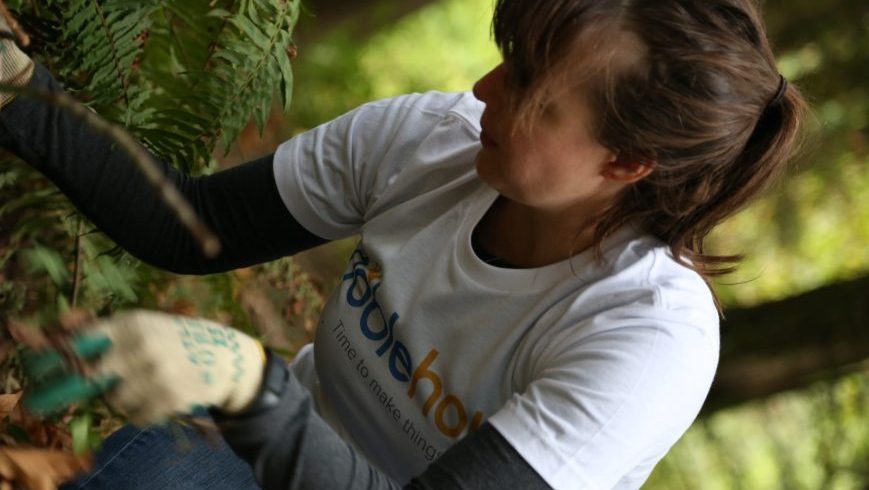Volunteering to help others is a highly rewarding aspect of one’s personal life. Yet, some may find it difficult to find the time or the right organization. Now with the growing trend of corporate community engagement, making an impact is made easy. It also makes going to work more meaningful and enjoyable! Through corporate social responsibility (CSR) initiatives, companies work to improve the social, environmental, and economic impacts of their business operations. Volunteering is one important component that can help a company reach its CSR goals. When established correctly, volunteering through a CSR program, not only benefits the company, but also its employees, the nonprofits they work with, and the people who benefit from those programs.
How does volunteering benefit a company?
Volunteering enriches the workplace by reducing turnover, increasing employee engagement, and improving employee happiness. Offering volunteer programs also helps attract and retain top talent– including a large portion of current prospective employees: Millennials. Studies find that millennials are more likely to be engaged with and loyal to the company through volunteering and prefer to work for companies focused on social good.
Implementing a volunteer program can also help you prevent turnover by addressing reasons an employee will quit their job. These reasons range from lack of opportunities to office culture and relationships with others. If employees are feeling bored or unchallenged at work, or unable to contribute meaningfully to the company’s business goals, a volunteer program may be able to address each of these shortcomings in turn. Why? Because volunteering allows employees to put their natural abilities to good use and lets them cultivate skills, like leadership and problem-solving. These benefits translate back to their role in the company and can improve their daily work performance. In turn, a general improvement in employee performance will lead to a better overall mood and culture within the office.
Volunteering alongside co-workers and management also gives employees a chance to socialize and work together outside of the office. Employees from different departments, with different schedules, or with different levels of seniority will be able to spend time together. Sharing the volunteering experience can create a natural bond between employees who rarely see each other at the office. Strengthening bonds between employees can improve relationships and cultivate a sense of camaraderie in the workplace, as well.
Outside of employee happiness and relationships, volunteering is also better for a company’s ROI, even if it seems counter-intuitive to give away time and/or money as a for-profit organization. Because volunteering improves employee satisfaction and increases retention rates, this naturally drives down the cost required to attract and train new employees. And of course, volunteering itself helps serve the local, national, or global community–but it does not have to be an expensive endeavor. For example, smaller companies can volunteer general business skills such as basic budgeting, database management, or software applications, and more to nonprofits. They can also offer their employees’ services as “pro bono” to nonprofits in the area, especially if they have skills the organizations desperately need.
Setting up your volunteer program
Now that you’ve seen how volunteering benefits the company, you’ll want to set up your own company volunteer program. It can be overwhelming, but making the decision to volunteer as part of your CSR strategy is a step in the right direction.
Businesses setting up their own volunteer program should:
- Have a clear plan with outlined goals. Volunteer program options abound: formal company-wide programs that support one organization, paid volunteer time off (VTO) given to employees to spend how they choose, or company-sponsored days in which employees volunteer at select events. Find one that suits your goals best and decide how the program will be tracked and measured. Ensure everyone involved is aware of the guidelines to prevent miscommunication.
- Involve employees and leadership. Find out what causes your employees support to ensure enthusiastic participation. Don’t leave it all up to employees, though. When a well-chosen cause is also passionately supported by upper management, it shows employees that the volunteer program is not just for marketing purposes, and it’s something that leadership cares about–so they should, too.
- Track data and reassess strategy. Be sure to track quantifiable data, like how many total hours employees have volunteered and what was the estimated monetary value of those hours volunteered. Qualitative data is important too: What did the employees learn and how did they benefit from their volunteer time? Are they more satisfied with their work? Do they feel more engaged with the company? What was the impact on the nonprofit organization? Periodically evaluating progress will help tailor your volunteer program as it develops so you can improve it for the future.
Partner with a nonprofit for your volunteer program
After exploring your volunteer program options, you might be wondering how exactly you’re going to get your employees to start volunteering–or where they’d even volunteer. A nonprofit/for-profit partnership might be just the thing you need. By developing a strong partnership with a nonprofit (or multiple nonprofits), you’ll be able to “walk the walk” of your corporate social responsibility policy, and actually get your employee volunteers where they’re needed.
Bruce Burtch, cause marketing expert, has created strategies for helping companies and nonprofits develop mutually beneficial partnerships. Burtch says that strategic nonprofit partnerships are the key to successful business. “There is nothing in business today that provides as much economic and social benefit, on as many levels, to as many stakeholders, as a strategic partnership between any combination of the nonprofit, for-profit, education, and government sectors when focused on the greater good. Nothing else comes even close.”
The most obvious mutual benefit to a partnership with a nonprofit is positive word of mouth and brand image. A volunteering partnership may attract free media attention and coverage can open up potential relationships for the business, as well as in-kind donations or other partnerships for the nonprofit.
A good nonprofit and business volunteering partnership only works when they:
- Share a vision. What are the two organizations trying to accomplish together? It’s likely both nonprofit and company came together through similar missions. “Be sure to lay out the benefits that you provide to the community, and how your work benefits the business partner,” says Julia Campbell, author and social marketer. “Don’t worry about flashy benefits like putting their logo on a shirt – that’s not what really drives a business to partner with a nonprofit.”
- Define responsibilities. Clearly define the roles and responsibilities of each volunteer from the business. You should also hold everyone accountable, build trust, and provide better results for the cause. When each of your business’s volunteers knows what they are doing, the benefits of the partnership multiply.
- Measure and evaluate volunteers. Track volunteer hours, create reports on volunteer work provided or completed, and track the organization’s metrics. If you’re a nonprofit, are you noticing more donations or movement in a particular area as part of your partnership? For businesses, are you noticing happier employees, better work, or an increase in revenue thanks to increased visibility?
- Focus on transparency. If problems arise while volunteering, bring it into the open–tactfully, of course. When both parties feel comfortable speaking up about tough issues, they can be resolved more efficiently.
- Practice flexibility. Both the company and the nonprofit have likely evolved since they opened their doors. A partnership between the two will naturally do the same. Being accommodating and allowing the partnership and your volunteers’ roles to grow will set the tone for a successful future.
The foundation of a successful volunteer program
Maintaining a successful volunteer program (and a partnership with a nonprofit to carry out that program) takes passion and dedication. But the return on this investment is worth it: businesses will see happier and more engaged employees, which decreases costs to hire new employees and increases retention rates. Employees who volunteer will improve their work skills and relationships between other employees and management, leading to a stronger team. Partnering with a nonprofit to offer a volunteer program allows both parties to work toward a shared mission, improving the community, and strengthening CSR initiatives.
Are you ready to begin a CSR program? We can help! Our experienced professional services team can help you with your CSR initiatives. From goal setting and best practices to implementation, data collection, and analysis, our team is passionate about CSR and helping our customers make an impact. Contact us today!
Since 2007, NobleHour has proven to be the volunteer management solution for organizations across the nation. Our plug ‘n play software connects companies, schools and individuals with nonprofits. Volunteer, measure the good you’re doing, and share it with others. It’s that simple.
With offices in Lakeland, FL, and Portland, OR, the we are dedicated to empowering good in communities across the country.
By NobleHour Staff:

Allison Hale
Director of Marketing
TreeTop Commons
Portland, Oregon
Allison is the Director of Marketing for TreeTop Commons, and its products; NobleHour and Collaboratory. A Portland native, Allison volunteers regularly for community nonprofits that support sustainability programs, and at her childrens’ school teaching art literacy. |
